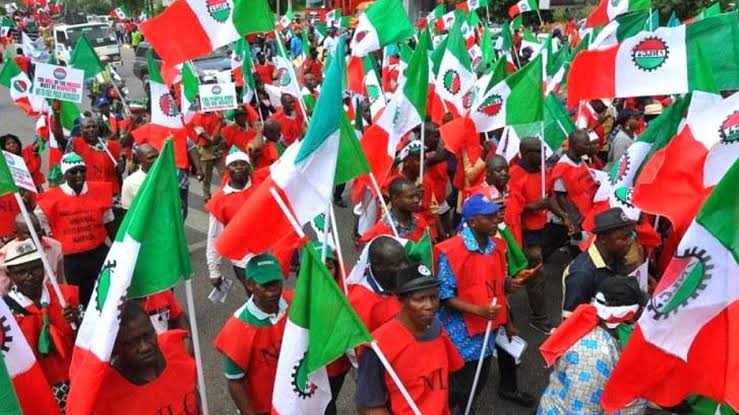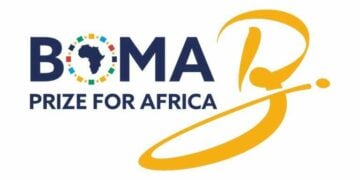The organised labour comprising the Nigeria Labour Congress (NLC) and the Trade Union Congress (TUC) has announced the commencement of an indefinite nationwide strike starting Monday, June 3rd, 2024.
The action comes as a direct response to the unfruitful negotiations with the government over the proposed minimum wage and the recent controversial increase in electricity tariffs.
The negotiations finally collapsed yesterday after failed 7th attempt by the 37 members tripartite committee to reach a definite new minimum wage figure for Nigerian workers with the organised labour expressing frustration over the government’s lack of commitment and representation at the negotiation meeting yesterday.
Reacting to the declaration of the strike, the federal government accused Labour of walking out of negotiations and acting hastily, while the next meeting has been scheduled for Monday.
Although the federal government at the meeting earlier in the week shifted ground from the previous N57,000 to a new proposal of N60,000.
However, the organised labour rejected the offer even though they reduced their demand from N497,000 stance of last week to N494,000.
The federal government through the minister of Labour and Employment, Nkeiruka Onyejeocha further appealed to the organised labour to be considerate and patriotic in their demands for a new minimum wage.
However , the appeal landed on deaf ears particularly as the labour unions insisted on workers’ living wage that reflects the current economic realities.
At a briefing in Abuja yesterday to herald the strike, both the Nigeria Labour Congress (NLC ) led by the president, Comrade Joe Ajaero and the president of the Trade Union Congress of Nigeria (TUC ) stated that there was no substantive ministers presented at the reconvene meeting and therefore no federal government authority to make decisions.
The labour unions have expressed further disappointment with the government’s lack of seriousness and apparent disregard for the demands of Nigerian workers.
The absence of key government officials at the negotiation meetings has been cited by the labour union leaders as evidence of the government’s disinterest in resolving the negotiations of the new minimum wage.
LEADERSHIP had reported how the organised labour issued ultimatum to the federal government on May 1st, 2024, where they lamented the absence of any meaningful progress from the government’s side.

The ultimatum demands include the conclusion of the minimum wage negotiations by the end of May and a reversal of the electricity tariff hike from N225/kwh to N65/kwh.
However, despite a nationwide protest on May 13th on the electricity tariff increment and widespread public outcry, the government’s response has been deemed by the labour as inadequate.
Both NLC and TUC have emphasised that Nigerian workers, who form the backbone of the nation’s economy, are entitled to fair wages that align with current economic realities.
They said, “The Nigeria Labour Congress (NLC) and the Trade Union Congress (TUC) express grave concern and disappointment over the federal government’s failure to conclude and pass into law a new National Minimum Wage Act and reverse the vexatious hike in electricity tariff to N65/kwh.
Today’s meeting further demonstrated the unseriousness and apparent contempt with which the Nigerian state holds the demands of Nigerian workers and people. No Governor was present and Ministers absent except the Minister of state for Labour and Employment who doubles as a conciliator. There was none present on the side of the government with appropriate authority to commit them to any outcome; in essence, Government abandoned the meeting”.
The continued “ We consider this disdainful and shows lack of commitment to a successful national minimum wage negotiation exercise.
In light of this persistent inaction, we, the Nigeria Labour Congress (NLC) and the Trade Union Congress (TUC), hereby issue a notice of commencement of an indefinite nationwide strike to the federal government.
We reiterate that the since the national minimum wage negotiation exercise has not been concluded and the agreed wage passed into law; the hike in electricity tariff not reversed and categorization of consumers into Bands not stopped as demanded; Nigerian workers are compelled by these failures to embark on an indefinite nationwide industrial action beginning on Monday, the 3rd of June, 2024 to press home our demands”.
They called on all affiliates, state councils, civil society organisations, market men and women, and the general populace to unite in demanding the government’s attention to the welfare of its people.
Federal Government Responds
But according to a statement released by members of the Tripartite Committee on the National Minimum Wage; at the last meeting of Tuesday, 28th May, 2024, all tripartite partners were invited to make their offers.
Employers made up of Government side and Organised Private Sector, the committee said, made offers of N60,000.00 per month which is 100% increase on the existing National Minimum Wage of 2019.
On their part, the Organised Labour made an offer, of N494,000 per month which is an increase of 1,547% on the existing National Minimum Wage of 2019.
The statement read, “During the course of the meeting organised labour left the meeting to continue further consultations before they shift grounds again.
“These decisions were arrived at the meeting with full attendance including the personal attendance of the Hon. Minister of Finance & Coordinating Minister of the Economy, Hon. Minister of Budget and National Planning as well as Hon. Minister of Labour & Employment.”
The meeting was later adjourned to Monday, 3rd June 2024.
The committee said, “however, after the Chairman reached out to Organised Labour and they agreed to hold the meeting on Friday, 31st May 2024 and notices were sent to all members.
“At the meeting Organised Labour when called upon to make their concession, or new offers outside of the last N494,000 per month when requested, insisted on the employers to first shift grounds.
“Both sides stated that their offers of N60,000.00 per month, which is 100% increase on the existing National Minimum Wage of 2019, were based on prevailing economic considerations and governments non-monetary incentives.”
Thereafter organised labour, the committee said, walked out of the meeting.
During the continuation of the meeting the Government further defended their offer of N60,000.00 per month, was based on economic considerations and non-monetary incentives which include the following:
N35,000 wage award for all treasury-paid Federal workers.
100 billion naira for the procurement of CNG-fuelled busses and CNG conversion kits.
125-billion-naira conditional grant and financial inclusion to MSMEs.
N25,000 each to be shared to 15 million households for 3 months.
185 billion palliatives (loans to States) to cushion the effects of fuel subsidy removal.
200 billion naira to support the cultivation of hectares of land to boost food production.
75 billion naira to strengthen the manufacturing sector.
1 trillion naira for student loans for higher education.
Release of 42,000 metric tons of grains from strategic reserves.
Purchase and onward distribution of 60,000 metric tons of Rice from the rice millers association.
Recent salary increase of 25-35 per cent on all consolidated Salary structures for federal workers.
90% subsidy on health costs for Federal Civil Servants registered on NHIS.
Light rail commissioned in Abuja to relieve transportation cost till the end of the year. Lagos State had already commence same initiative with their Blue and Red lines.
In addition to the freedom of Civil Servants to engage in agriculture, Federal Government has approved the inclusion of ICT services for alternate sources of income.
In conclusion, the meeting agreed that even where major and small businesses are closing down with consequent loss of jobs, the outcome of a new National Minimum Wage should be such that it will not trigger further massive job losses. It further noted that linking the strike to electricity hikes with the NMW determination was not fair to the negotiating parties.





